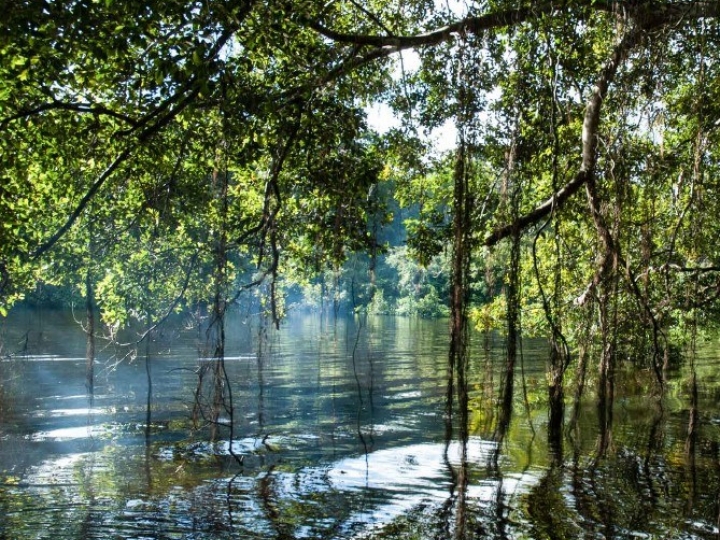This article was originally published in Panorama (in Norwegian) on 24 June 2024. It is written by Katrine Ringhus, Country Director for the Norwegian Human Rights Fund in Colombia, and Ingeborg Moa, Executive Director for the Norwegian Human Rights Fund.
The organisation Frontline Defenders recently published a report on the situation of human rights defenders globally. It was not encouraging reading.
At least 300 rights defenders were killed in 2023, and indigenous rights defenders were the most vulnerable group, with 92 indigenous activists and 64 environmental and land rights activists killed.
Many of these killings took place in key forest countries such as Colombia, Brazil, Indonesia and Peru. And as many as 47 per cent of the 300 murders occurred in Colombia, which is one of the most dangerous countries to be an environmental and land rights defender in, according to the report.
Such indigenous activists and representatives from affected communities, who are willing to sacrifice their lives to fight for the conservation of tropical forests, and who are often the most effective guardians of them, must have a voice in all international forums.
Oslo Tropical Forest Forum
Ministers and other decision-makers, multilateral institutions, civil society, indigenous peoples' organisations and the private sector are gathering at the Oslo Tropical Forest Forum to discuss deforestation and REDD+, carbon quotas, sustainable agriculture and forest crime.
We need to make sure that the voices of those who live off, in and with the forest, and who are victimised because of their struggle to protect the ecosystems we all depend on, are actually heard.
Not least, they must be supported through funding mechanisms where the funds reach them, and where they themselves define what kind of work it is most important to spend the funds on to preserve the forest.
More can be done
The latest report from the Forest Tenure Funders Group (FTFG), the working group following up on the 2021 Forest Tenure Pledge, in which Norway and other donor countries pledged increased support for indigenous peoples' and local communities' land rights and forest management, concluded that much of the existing climate finance for local communities remains insufficient and inflexible.
There has been some important progress in this area, but despite this, FTFG's report shows that much of the funding is still stuck in complicated global funds and slow bureaucratic systems, that the risks are often considered too high and that the administrative requirements are too demanding.
Here in Norway, Norad's independent evaluation department recently published an evaluation of Norway's international climate and forest initiative (KOS)'s support for civil society and whether the rights of indigenous peoples, local communities and environmental defenders have been safeguarded.
Among other things, the evaluation recommended considering separate schemes for small grants to indigenous peoples and grassroots organisations, or different funding channels based on organisation types, roles and capacity in future calls for proposals. We think this is an outstanding idea.
Any effective approach to deforestation and sustainable forest management must include comprehensive human rights perspectives and actions. This means participation where the agenda is set and designing aid programmes on the terms of forest-dependent communities, not just on goals defined by donor countries.
It also means flexible and customised support schemes that are developed based on local needs and knowledge, adapted to the individual organisation or community and the context in which it operates. Flexibility also means being able to adapt the requirements set for recipients and daring to take calculated risks.
Such support must take a holistic approach to protecting and preventing risks and attacks on environmental protection organisations and indigenous and local leaders. This means, among other things, strengthening collective self-protection mechanisms, psychosocial follow-up, cultural identity and organisational structure, as well as mechanisms for self-governance for their own land and forest areas.
This is fundamental to ensuring appropriate solutions that not only safeguard human rights or the conservation of forest ecosystems, but where the interaction between these two considerations strengthens both.
The important role of civil society
Such support cannot only be channelled through bilateral aid and government-managed funds where political will and leadership come into play. It must be channelled to an independent civil society.
Providing increased and flexible support to local indigenous and grassroots organisations while ensuring a rights-based approach and accountability for the use of Norwegian funds is a comprehensive and demanding process. It requires in-depth thematic and contextual knowledge, non-bureaucratic programme cycles and the capacity to invest human resources and time in close follow-up of partner organisations on the ground.
But it can and must be done, and we hope the participants at the Oslo Tropical Forest Forum will keep this important topic in mind in all conversations during the conference.
To quote one of our Colombian partners:
"The best way for you to support us and our territories is to strengthen our organisations directly, so that we ourselves have the capacity to negotiate and promote our own definitions and proposals for development".
Cover photo: Fundación OMACHA

